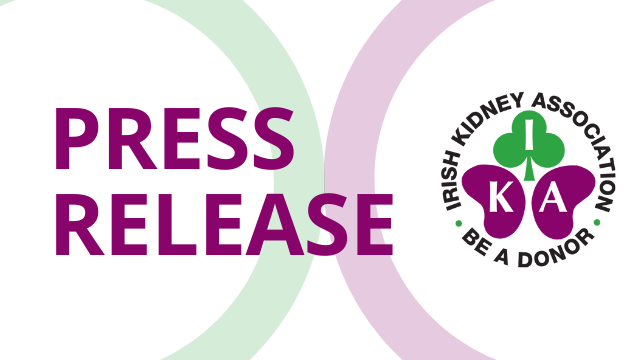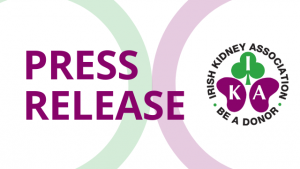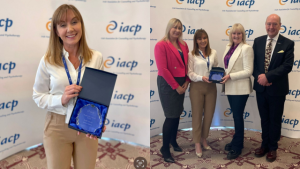The Irish Kidney Association (IKA) is delighted to have been awarded a major grant from the HRCI/HRB Joint Funding Scheme towards research into ‘patient reported outcomes’ for patients with rare kidney diseases, referred to as Glomerular Disease (GD). It states that this research, which it will conduct in partnership with University Hospital Galway and the Irish Nephrology Society, will give ‘a strong voice to GD patients’ which will meaningfully guide future care towards ‘better clinical outcomes and quality of life’.
Glomerular Diseases (GDs) are rare kidney diseases that damage kidney filters (glomeruli) and can result in kidney failure, hospitalisation, and death. GDs are the third leading cause of kidney failure worldwide GDs also affect health-related quality of life (HRQOL), including reduced ability to participate in normal life, fear or anxiety about the future, low mood, or eroded confidence. The patient reported experience approach to research of the impact of their GD and medications will provide an instrument to help understand and meet patients’ needs.
Speaking about the HRCI grant announcement, Ms. Carol Moore, Chief Executive of the Irish Kidney Association said, “this matched fund grant by the HRCI of up to €100,000 is greatly welcome as it will provide our registered charity, for the first time, the opportunity to conduct high quality peer reviewed research, introducing measurements which put patient reported experience centre stage. By giving a strong voice to patients, the research results will help guide future care towards better clinical outcomes and quality of life for patients with Glomerular Disease.”
“Patient-Reported Outcomes are poorly studied in Glomerular Diseases, yet recent evidence* (see footnote) suggests that they are as, if not more, important to patients with Glomerular Disease than traditional clinical measurements. This innovative and internationally collaborative research, with strong patient and public involvement, is strongly aligned with the strategic aims of the Irish Kidney Association and the Irish Nephrology Society.”
“The IKA is partnering with the Irish Nephrology Society for this important study and the research will be undertaken by a team at Galway University Hospital. The overall aim of the research is to develop and validate an instrument for measuring ‘Patient Reported Outcomes’ that are deemed important and relevant by patients with Glomerular Disease. As a secondary aim, the research study will evaluate whether participation in the IKA’s “Living Well” peer-led chronic disease self-management programme improves health related quality of life in patients with Glomerular Disease.”
“We believe that achieving a better understanding of patient reported outcomes will enhance the clinical care of patients with Glomerular Disease and the development and evaluation of therapies that meaningfully improve patients’ daily lives.”
The ‘Patient Reported Outcomes – Glomerular Disease’ (PRO-GD) study will have three phases:
- The research team will consult with Irish patients with glomerular disease (GD) to develop a new PRO questionnaire (PRO-GD) that is relevant and acceptable to Irish patients. These patients will also help co-design advertising and recruitment strategies for the study.
- Irish patients with GD will be invited to complete the PRO-GD questionnaire to confirm that using this questionnaire in patients with GD is valid and reliable
- Some patients will then complete the Living Well programme. A follow-up PRO-GD questionnaire responses will be compared between those who do versus those who don’t complete this programme, to evaluate the impact of the programme on HRQOL.
The Irish Kidney Association expects this research to:
- Increase awareness amongst patients, their families, their clinicians, and wider society, of the effect that GD can have on patient wellbeing;
- Develop a new PRO-GD questionnaire that can be applied in diverse clinical and research settings e.g. more comprehensive reporting of drug treatment effects to support shared treatment decision-making; and
- Determine whether completing the Living Well programme improves HRQOL in patients with GD.
-ENDS-
FOOTNOTE: Clinical research in patients with GD mainly focuses on surrogate laboratory outcomes such as kidney function and proteinuria, or clinical outcomes such as kidney failure and death. However, these measures often poorly associate with patient perceptions of their illness. In response, PROs (i.e. direct reports from patients about how they feel or function, without amendment or interpretation by a clinician or researcher) are increasingly incorporated in clinical and research practice as quantitative assessments of the patient voice. However, obtaining a better understanding of the impact that GDs, and their treatments, can have on patients with GD has been hampered by the absence of a PRO instrument specific to the needs of patients with GD.
*In one U.S. study of 766 patients receiving outpatient chemotherapy for advanced cancer, regular reporting of PROs by patients to their treatment team resulted in better HRQOL and fewer hospitalisations compared to usual care. Incorporating PRO measurement into clinical care can also guide medical decision-making e.g., medication adjustments, lifestyle modifications, and timely specialist referrals. PRO instruments can also ensure clinical trials comparing treatments provide a more relevant evidence base that better informs shared decision-making between doctors and patients. Finally, disease-specific PROs can increase measurement sensitivity and the likelihood of detecting treatment benefits when they exist. In light of these and other data, the National Institutes of Health (NIH) and Food and Drug Administration (FDA) in the U.S. urge clinicians and researchers to examine PROs in medical decision-making, research, and clinical trials.
The Joint Funding Scheme, which Health Research Charities Ireland (HRCI) runs in partnership with the Health Research Board (HRB), offers the opportunity to HRCI members, like the Irish Kidney Association, to secure matched funds from the HRB to support research of importance to their communities. It also helps charities to fund research according to international best practice in research governance. Health Research Charities Ireland (HRCI). Health Research Charities Ireland (HRCI) is the national umbrella organisation of charities active in health, medical and social care research, together representing over 1 million people in Ireland. Through support and advocacy, we represent their joint interests, to achieve our vision of improved lives through a united community of health research charities. We also run the Irish Health Research Forum, bringing together all stakeholders to improve health research in Ireland.




